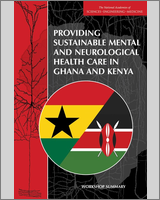NCBI Bookshelf. A service of the National Library of Medicine, National Institutes of Health.
Mental, neurological, and substance use (MNS) disorders have a substantial impact on global health and well-being. Disorders such as depression, alcohol abuse, and schizophrenia constitute about 13 percent of the total burden of disease. Worldwide, MNS disorders are the leading cause of disability, and the 10th leading cause of death. Despite this high burden, there is a significant shortage of resources available to prevent, diagnose, and treat MNS disorders. Approximately four out of five people with serious MNS disorders living in low- and middle-income countries do not receive needed health services.
This treatment gap is particularly high in Sub-Saharan Africa (SSA). Challenges to MNS care in SSA countries include a lack of trained mental health professionals, few mental health facilities, and low prioritization for MNS disorders in budget allocations. African countries, on average, have one psychiatrist for every 2 million people, whereas European countries have one psychiatrist per 12,000 people.
Expanding on previous efforts to address the development and improvement of sustainable mental health systems in SSA, the Institute of Medicine convened this 2015 workshop series, bringing together key stakeholders to examine country-specific opportunities to improve the health care infrastructure in order to better prevent, diagnose, and treat MNS disorders. Providing Sustainable Mental and Neurological Health Care in Ghana and Kenya summarizes the presentations and discussions from these workshops.
Contents
- The National Academies of SCIENCES • ENGINEERING • MEDICINE
- PLANNING COMMITTEE ON PROVIDING SUSTAINABLE MENTAL HEALTH CARE IN GHANA AND KENYA: A WORKSHOP SERIES
- FORUM ON NEUROSCIENCE AND NERVOUS SYSTEM DISORDERS
- BOARD ON GLOBAL HEALTH
- Reviewers
- 1. Introduction and Overview
- 2. Kenya
- 3. Ghana
- 4. Case Studies
- AFRICA MENTAL HEALTH FOUNDATION: COMMUNITY PARTNERSHIPS
- BASICNEEDS
- DIRECT RELIEF AND BREAST CARE INTERNATIONAL: COLLABORATION
- EMERGING MENTAL HEALTH SYSTEMS IN LOW- AND MIDDLE-INCOME COUNTRIES (EMERALD): STRENGTHENING HEALTH SYSTEMS
- FIGHT AGAINST EPILEPSY: STAKEHOLDER ENGAGEMENT
- KENYA ASSOCIATION FOR THE WELFARE OF PEOPLE WITH EPILEPSY: PUBLIC EDUCATION
- THE KINTAMPO PROJECT: FOCUS ON COMMUNITY-BASED CARE
- PROGRAM FOR IMPROVING MENTAL HEALTH CARE (PRIME): BUY-IN, BUY-IN, BUY-IN
- PROJECT FIVES ALIVE!: SCALING UP
- PARTNERS IN HEALTH IN RWANDA: INTEGRATION OF MENTAL HEALTH INTO THE GENERAL CARE SYSTEM THROUGH PUBLIC-SECTOR COLLABORATION AND LEVERAGE OF EXISTING HEALTH PLATFORMS
- MENTAL HEALTH CARE IN TURKEY: POLICY DEVELOPMENT
- WORLD ASSOCIATION FOR SOCIAL PSYCHIATRY AND SANOFI: COUNTRY-SPECIFIC APPROACHES
- 686 PROJECT IN CHINA: FOCUS ON GENERAL PRACTITIONERS
- 5. Perspectives on Potential Next Steps
- APPENDIXES
- A. References
- B. Workshop Agendas
- C. Registered Attendees
- D. Participant Biographies
- E. Providing Sustainable Mental Health Care in Kenya: A Demonstration ProjectAna-Claire Meyer and David Ndetei.
- F. Providing Sustainable Mental Health Care in Ghana: A Demonstration ProjectJulian Eaton and Sammy Ohene.
Rapporteurs: Sheena Posey Norris, Erin Hammers Forstag, and Bruce M. Altevogt.
Suggested citation:
National Academies of Sciences, Engineering, and Medicine. 2016. Providing sustainable mental and neurological health care in Ghana and Kenya: Workshop summary. Washington, DC: The National Academies Press.
- NLM CatalogRelated NLM Catalog Entries
- Review Strengthening Human Resources Through Development of Candidate Core Competencies for Mental, Neurological, and Substance Use Disorders in Sub-Saharan Africa: Workshop Summary[ 2013]Review Strengthening Human Resources Through Development of Candidate Core Competencies for Mental, Neurological, and Substance Use Disorders in Sub-Saharan Africa: Workshop SummaryA Collaboration of the Forum on Neuroscience and Nervous System Disorders and the African Science Academy Development Initiative, Board on Health Sciences Policy, Institute of Medicine. 2013 Oct 8
- Review Global Priorities for Addressing the Burden of Mental, Neurological, and Substance Use Disorders.[Mental, Neurological, and Subs...]Review Global Priorities for Addressing the Burden of Mental, Neurological, and Substance Use Disorders.Patel V, Chisholm D, Parikh R, Charlson FJ, Degenhardt L, Dua T, Ferrari AJ, Hyman S, Laxminarayan R, Levin C, et al. Mental, Neurological, and Substance Use Disorders: Disease Control Priorities, Third Edition (Volume 4). 2016 Mar 14
- Review Workforce Innovations to Expand the Capacity for Surgical Services.[Essential Surgery: Disease Con...]Review Workforce Innovations to Expand the Capacity for Surgical Services.Bergström S, McPake B, Pereira C, Dovlo D. Essential Surgery: Disease Control Priorities, Third Edition (Volume 1). 2015 Apr 2
- Review Addressing the burden of mental, neurological, and substance use disorders: key messages from Disease Control Priorities, 3rd edition.[Lancet. 2016]Review Addressing the burden of mental, neurological, and substance use disorders: key messages from Disease Control Priorities, 3rd edition.Patel V, Chisholm D, Parikh R, Charlson FJ, Degenhardt L, Dua T, Ferrari AJ, Hyman S, Laxminarayan R, Levin C, et al. Lancet. 2016 Apr 16; 387(10028):1672-85. Epub 2015 Oct 8.
- Review Excess Mortality from Mental, Neurological, and Substance Use Disorders in the Global Burden of Disease Study 2010.[Mental, Neurological, and Subs...]Review Excess Mortality from Mental, Neurological, and Substance Use Disorders in the Global Burden of Disease Study 2010.Charlson FJ, Baxter AJ, Dua T, Degenhardt L, Whiteford HA, Vos T. Mental, Neurological, and Substance Use Disorders: Disease Control Priorities, Third Edition (Volume 4). 2016 Mar 14
- Providing Sustainable Mental and Neurological Health Care in Ghana and KenyaProviding Sustainable Mental and Neurological Health Care in Ghana and Kenya
Your browsing activity is empty.
Activity recording is turned off.
See more...
